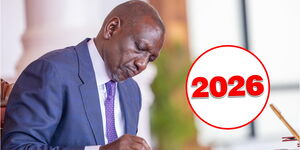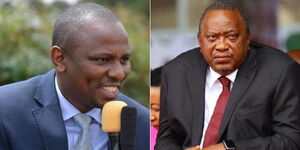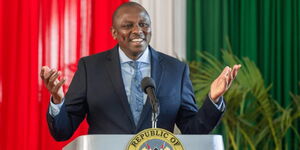Cartels within the Ministry of Health (MOH) have reportedly resurfaced as the docket, under CS Mutahi Kagwe, grapples with the supply and administration of vaccines.
Kagwe, on Friday, April 2, banned the importation of vaccines not authorised by the World Health Organisation (WHO), after private entities spent millions of shillings to ship in the controversial Russian Sputnik V vaccine.
"There will be no licensing of private players in the importation of vaccines and any such licence given will be and is hereby terminated. The only agent for vaccination in Kenya will remain the government of the Republic of Kenya until further notice.
"The participation of the private sector in the vaccination exercise now threatens the gains made in the fight against Covid-19 across the country," Kagwe directed.
This directive not only spells losses for companies that had spent a fortune to import the Russian vaccine which is said to have 92 percent efficiency but also raises questions over how it was cleared for emergency purposes in Kenya.
The vaccine could not have been cleared by the Pharmacy and Poisons Board (PPB) without the authorisation of senior officials at the Ministry of Health.
Experts argued that this was a clear indication that cartels within the ministry had resurfaced, a few months after embezzling billions in the importation of swabs and personal protective equipment (PEPs) in the Kenya Medical Supplies Authority (KEMSA) scandal.
“Just like any other sector or ministry, in this building, we have a fair share of criminals who use the name of the ministry to con Kenyans,” Kagwe warned in June 2020 while complaining of being frustrated by cartels.
Kagwe's docket at first said that the Russian vaccine was to be offered for emergency purposes but later backtracked, saying that any vaccine administered without MOH clearance was illegal. Further, any vaccine being sold to Kenyans was contravening the ministry's laws and regulations and the Public Health Act.
However, PPB approved the vaccine while aware that it was not approved by WHO and was also going to be sold in Kenya at Ksh 5,500.
So far Deputy President William Ruto, his wife Mama Rachel Ruto, family members, and a few celebrated lawyers took the Russian vaccine whose second dose is offered after 21 days, unlike the approved Astra Zeneca whose second dose is administered after three months.
Private entities said that they had already imported 75,000 doses and had paid Ksh 201 million for insurance. Other costs incurred include Ksh 10 million importation fee. It remains a mystery where the doses will be taken and how the costs will be covered after Kagwe's ban and revocation of private licences.
"The ban on private importation and administration of Covid-19 vaccines by Health CS Mutahi Kagwe is the clearest sign that the exercise is intended to be fraudulently commercialized, the KEMSA style. The Government has failed us big time on this pandemic. It is time to say no!" Law Society of Kenya President Nelson Havi cautioned.












